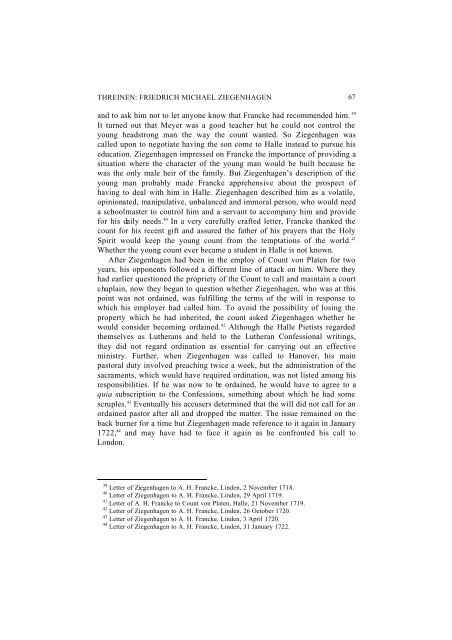LUTHERAN THEOLOGICAL REVIEW - Concordia Lutheran Seminary
LUTHERAN THEOLOGICAL REVIEW - Concordia Lutheran Seminary
LUTHERAN THEOLOGICAL REVIEW - Concordia Lutheran Seminary
You also want an ePaper? Increase the reach of your titles
YUMPU automatically turns print PDFs into web optimized ePapers that Google loves.
THREINEN: FRIEDRICH MICHAEL ZIEGENHAGEN 67<br />
and to ask him not to let anyone know that Francke had recommended him. 39<br />
It turned out that Meyer was a good teacher but he could not control the<br />
young headstrong man the way the count wanted. So Ziegenhagen was<br />
called upon to negotiate having the son come to Halle instead to pursue his<br />
education. Ziegenhagen impressed on Francke the importance of providing a<br />
situation where the character of the young man would be built because he<br />
was the only male heir of the family. But Ziegenhagen’s description of the<br />
young man probably made Francke apprehensive about the prospect of<br />
having to deal with him in Halle. Ziegenhagen described him as a volatile,<br />
opinionated, manipulative, unbalanced and immoral person, who would need<br />
a schoolmaster to control him and a servant to accompany him and provide<br />
for his daily needs. 40 In a very carefully crafted letter, Francke thanked the<br />
count for his recent gift and assured the father of his prayers that the Holy<br />
Spirit would keep the young count from the temptations of the world. 41<br />
Whether the young count ever became a student in Halle is not known.<br />
After Ziegenhagen had been in the employ of Count von Platen for two<br />
years, his opponents followed a different line of attack on him. Where they<br />
had earlier questioned the propriety of the Count to call and maintain a court<br />
chaplain, now they began to question whether Ziegenhagen, who was at this<br />
point was not ordained, was fulfilling the terms of the will in response to<br />
which his employer had called him. To avoid the possibility of losing the<br />
property which he had inherited, the count asked Ziegenhagen whether he<br />
would consider becoming ordained. 42 Although the Halle Pietists regarded<br />
themselves as <strong>Lutheran</strong>s and held to the <strong>Lutheran</strong> Confessional writings,<br />
they did not regard ordination as essential for carrying out an effective<br />
ministry. Further, when Ziegenhagen was called to Hanover, his main<br />
pastoral duty involved preaching twice a week, but the administration of the<br />
sacraments, which would have required ordination, was not listed among his<br />
responsibilities. If he was now to be ordained, he would have to agree to a<br />
quia subscription to the Confessions, something about which he had some<br />
scruples. 43 Eventually his accusers determined that the will did not call for an<br />
ordained pastor after all and dropped the matter. The issue remained on the<br />
back burner for a time but Ziegenhagen made reference to it again in January<br />
1722, 44 and may have had to face it again as he confronted his call to<br />
London.<br />
39 Letter of Ziegenhagen to A. H. Francke, Linden, 2 November 1718.<br />
40 Letter of Ziegenhagen to A. H. Francke, Linden, 29 April 1719.<br />
41 Letter of A. H. Francke to Count von Platen, Halle, 21 November 1719.<br />
42 Letter of Ziegenhagen to A. H. Francke, Linden, 26 October 1720.<br />
43 Letter of Ziegenhagen to A. H. Francke, Linden, 3 April 1720.<br />
44 Letter of Ziegenhagen to A. H. Francke, Linden, 31 January 1722.













